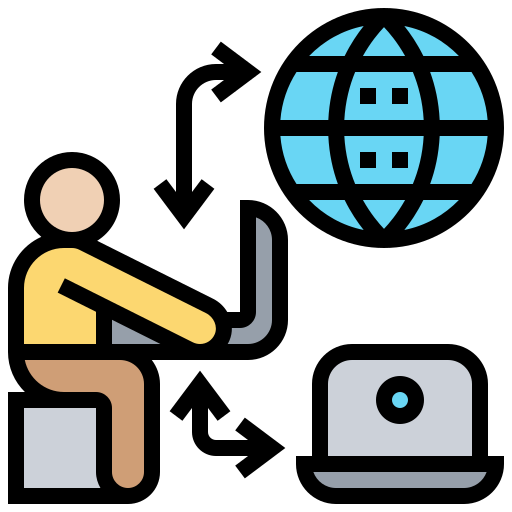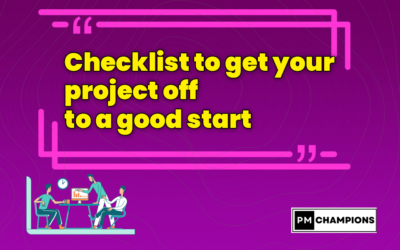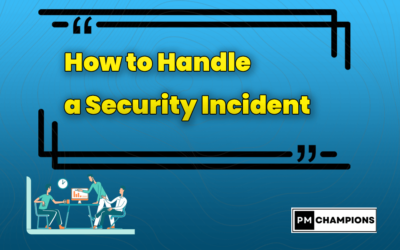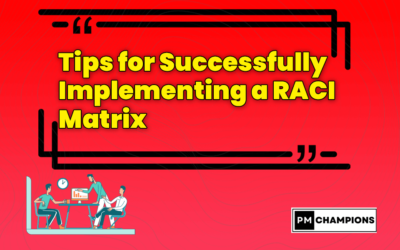“You won’t get a second chance to make a good first impression”
Coco Chanel

Agility:
What is a kick-off?
This is a project kick-off meeting. An essential part of any project management methodology, it is a departure that should not be neglected and is decisive for the success of the project.

This is an opportunity to review the issues, objectives, action plan, project schedule, deadlines,budget, business constraints, risks, best organizational and communication practices, deliverables and governance bodies.
Main benefits of the kick-off project
Build trust
Between the project manager (project manager and/or project director), the project team, and stakeholders. A well-prepared and well-conducted kick-off immediately gives confidence to the stakeholders. It is also an opportunity to exchange formally and informally with the client and other stakeholders, before facing the eternal difficulties and unforeseen events.

Boost team morale and motivation
The project kick-off meeting explains where we collectively need to go, why we need to go and how we plan to do it. Having this level of information reassures the members of the project team, and unites them around a common goal.
Review the identified risks
The risks identified by the service provider during the pre-sales session are presented during the meeting, along with the associated action plan to mitigate or even eliminate this risk. Ensures that there are no other risks identified by stakeholders.
Aligning the vision
All the elements of the project are reviewed and validated during the meeting by all the actors around the table. At the end of the meeting, everyone has the same vision of the project, its challenges, its objectives and how to achieve them.
The Kick-off allows you to validate the stakes, expectations and objectives one last time with the project sponsor.
Validate project sequences

The kick-off ensures that the project planning is consistent with the client’s expectations and business constraints: the schedule, the breakdown, the deadlines, the interdependencies, etc. The various governance bodies are agreed upon and planned.
Answering stakeholders’ questions
The kick-off is an opportunity to answer all the questions of the stakeholders, the customer, the end users. Everything must be crystal clear for all participants. Any fears and doubts are dispelled at the same time.
When to schedule the Kick-off?
The Kick-off should be planned as early as possible in the project, by the project manager, as long as he has the necessary and sufficient information to prepare it.

Ideally, you should plan the kick-off before the technical and operational actions.
It is recommended to schedule it 1 to 2 weeks after you have been officially appointed project manager and/or project director on this file, which allows time to prepare for the meeting.
Face-to-face or remote kick-off?
The Kick-off can be held both face-to-face and remotely by videoconference.
However, it is recommended that you meet with the client in person as a project manager. It’s an opportunity to bond and build trust.
Project team members and other stakeholders can stay in video conferencing if it makes their lives easier.
2 types of kick-off
The internal project kick-off
This meeting brings together the project manager (Project Director and/or Project Manager), all members of the project team, service providers, suppliers and partners, in order to discuss how they will organize themselves together as a group to meet the client’s needs.
This internal meeting usually takes place before the official kick-off with the client. This is a preparatory meeting or synchronization point to set up the final details before the kickoff meeting with the customer.
The external project kick-off
This is the official kick-off meeting. The project manager (Project Director and/or project manager), the customer, stakeholders, representatives of suppliers and partners, as well as representatives of end users and/or business services on the client side are invited.
Who to invite to the kick-off?
The Kick-off must bring together at least the project manager, the client, as well as any other stakeholders whose presence is necessary or desired.
Depending on the type of project, this may include technical experts, partners, service providers, customer business service representatives, end users, etc.
The kick-off agenda
1. Round of presentation
2. Presentation of the project: context and challenges
3. Detailed presentation of the scope of the project
4. Objectives and KPIs
6. Presentation of the project team and roles
7. Presentation of the Governance Bodies
8. Presentation of key information:
- Schedule
- Deliverables
- Means
- Budget
- Project Risks
9. Q&A
10. Upcoming Meetings Scheduled
Participants in the kick-off project
| Project Actors |
Participation in the Internal kick-off |
Participation in the External kick-off |
On-site presence |
|---|---|---|---|
| Project Director | Obligatory | Obligatory | Preferably face-to-face |
| Project Manager | Obligatory | Obligatory | Preferably face-to-face |
| Business Engineer / Sales Representative | Obligatory | Obligatory | Face-to-face or videoconferencing |
| Project Team Members | Obligatory | Optional, depends on the number of participants | Face-to-face or videoconferencing |
| Suppliers / Subcontractors / Partners | Obligatory | Recommended. It depends on their scope and the impact seen by the client | Face-to-face or videoconferencing |
| Delivery Manager | Facultative | No | Video conference |
| Business Unit Manager | Facultative | No | Video conference |
| Customer | No | Obligatory | Preferably face-to-face |
| Users | No | Recommended to have a representative | Face-to-face or videoconferencing |
| Customer Business Services | No | Optional, it depends on the project | Videoconferencing, for availability and logistics issues |
| Stakeholders | No | Recommended, it depends on the project | Videoconferencing, for availability and logistics issues |
The 12 mistakes to avoid during the project’s kick-off meeting
❌Lack of preparation
The client should feel prepared and confident. They don’t want to feel like you’re just coming in and discovering the subject in a session with them.
❌Plan the Kick-off several weeks after the start
The Kick-off helps to clarify objectives, defines how the project team works and how collaboration with stakeholders takes place. It sets the tempo for the rest of the project. It is recommended to schedule the meeting 1-2 weeks after the project starts.
❌Inviting the Whole Earth
The more people you invite, the more chaotic the meeting is likely to be. Just like any meeting. Not to mention the organizational and logistical problems that it creates. Limit participants to a maximum of 10-15, and take advantage of video conferencing, for one-off speakers.
❌Skip the round table
Before going into the details of the project, a round table is beneficial to get to know each other, to know who you are talking to, and to clearly define the roles and responsibilities of each person.
❌Forgetting to recall the issues and context of the project
The context of the project influences the desired objectives, the action plan, the project schedule. To forget to talk about it is to forget to give meaning to your project.
❌Present a schedule that is anything but realistic
The schedule presents the key steps and milestones of the project. Nevertheless, it must be achievable, and correspond to the customer’s expectations.
❌Missing out on certain customer requests and expectations
Take the time to read and re-read the client’s request to be sure to respond to all requests. Indeed, there is nothing worse than being called to order by the customer, especially at the launch.
❌Not planning for future progress points
The actors gathered around the table are those who will participate in steering committees, project committees and other functional and technical workshops. It would be a mistake not to take advantage of the kick-off meeting to discuss this.
❌Forgetting to mention the risks and constraints of the project
Risks are inherent in any project. Take the time to focus on the risks during the kick-off meeting.
❌Making a commitment on the fly without ensuring it can be kept
Beware of commitments made too easily. Keep all the commitments made in the kick-off meeting. This will build trust between you and your customer.
❌Forgetting to proofread
Don’t leave gross mistakes in your PowerPoint presentation medium. Proofread it again, and check that the information entered is consistent. Otherwise, you will lose credibility and therefore trust.
❌Do not send support and meeting minutes
The minutes are essential for all project meetings. The Kick-off is no exception. He must recall everything that was said during the meeting, as well as the decisions taken. Please note that the deadlines for sending support and reporting may be contractual and subject to penalties. It is recommended to send the report within 24 to 48 hours maximum.






0 Comments